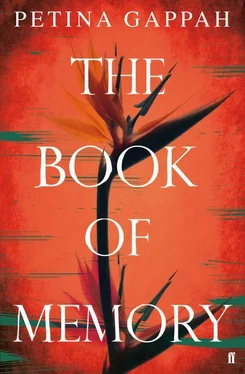That was on the fourth day of my first week in school. As I stood and shivered by the side of the pool, one of the girls came laughing at me and pushed me in. I have never known such terror. When our games mistress, Miss Flack, came in to get me, I struck out at her. Lloyd tried to teach me to swim at home, but I spent most of our lessons shivering with terror, and eventually he gave it up.
And then there was the day the Baptist almost drowned me. My mother was restless in her church attendance. She had been to different churches over the years, dragging us with her, almost as though she had to try them all out before she finally settled on one.
For a short period, we joined the Salvation Army. I loved it there because of the marching and the uniforms and the whistles. After that, my mother became one of the white-robed Apostolics, and sat with other white-garmented people under the shade of msasa trees. Here the women sat separately from the men, and always there were more women because most of the men had at least two wives.
Feeling my skin burning, I watched the sun glint off the shaven heads of men with long beards who said angry prayers that made their spittle fly out over their held-out staffs and land on my face. The group she joined worshipped near the Mukuvisi River. It did not matter whether it was wet or dry — we sat outside and worshipped in our long white garments that never seemed to get dirty, no matter how rough our surroundings.
Three Sundays after we joined this church, our whole family was baptised in the Mukuvisi, which on that day was no ordinary river in Salisbury but stood in for the River Jordan. The baptism was a wet and violent process. The whole person was submerged not once, not twice, but three times.
My mother was baptised first, then my father, then Joyi. When it came to my turn, the Baptist asked whether I accepted Jesus and rejected Satan. All I could think of was that vast, terrible river, and the water that was muddy and brown. There was something in that murderous water, a njuzu ; I just knew it, something that stole children. It would come for me, it was coming for me; I could feel it pulling me down, down.
‘Do you accept Jesus? Do you reject Satan?’ the Baptist said.
There was only one way that I could think of to save myself from the terror of all that water. In deadly fear, I clung to the Baptist. ‘No, no!’ I shouted. ‘I do not accept Jesus.’
My mouth filled with water and I could say no more. The choice was a simple one for me. Rejecting Satan meant putting my face in that river. Accepting Jesus meant the flow of that water over me.
‘Accept Jesus!’ the Baptist was now shouting. ‘Reject Satan!’
I screamed and swallowed water as I fought against him. I was now full of terror and all my strength was directed at making him stop.
He ducked me once more and when I came up, it was to scream louder than I had ever screamed before. The man ducked me again and I swallowed huge mouthfuls of the Jordan.
When he lifted my head out, I spluttered and screamed, ‘No, no, I do not accept Jesus!’
‘Legion!’ shouted the Baptist. ‘Satan, I command you. Release this child. I command you, Legion, in the name of Jesus, release this child.’
When he ducked me the third time, he held my head under the water. I struggled, then let go. I went limp and thought: it is coming, the thing is coming for me. It was then that I felt strong hands, familiar hands grabbing hold of me.
It was my father. He held me to him as I trembled. He and the Baptist then got into a shouting match. My father said he had frightened me, but the man said I had a strong spirit, an evil spirit that was in me.
‘Did you not hear her?’ he said, turning to the small band of congregants. Did you hear her refusing to reject Satan? Look at what she is. This child is an instrument of Satan.’
I clung to my father all the way home. We did not go back to that church again. For days afterwards, I dreamt of being pulled down, down, into the river to be received by a creature with long arms that gripped me and would never let me go.
My mother then discovered MaiChaza’s church, where the primary means of salvation was through elaborate rites of public confession, the confessions becoming more and more detailed and the sins confessed more outrageous: one woman confessed to performing as a witch from the age of three, while a man claimed to have killed his father with an axe at the age of seven. Three women confessed that they had eaten their children.
Then my mother met Sister Lucia and Brother Patrick. They belonged to a happy-clappy-tambourine church, the Church of the Felicitous Tidings of the New Gospel.
In the fields of the Apostolics, the songs were lugubrious and soporific. But in the community hall at Highfield, which served as the Church of the Felicitous Tidings for one and a half hours on Sundays, before giving way to the next church whose turn it was, the songs were catchy, happy, uplifting and infectious.
I began to look forward to going to church. I loved the music. I longed to be like Sister Lucia, beating along in time with her jangling tambourine, her red and white ribbons flying from it. My eyes closed in rapture as I sang about a wonderful treasure God gave without measure; we are travelling together, my Bible and I. One day, I vowed, I would own my very own tambourine.
The God of the Church of the Felicitous Tidings seemed like someone who actually cared. For the first time in as long as I could remember, I prayed for something other than dark skin; I prayed for a tambourine of my own. I imagined that I would adorn it in my favourite colours, in purple and orange ribbons. I fantasised about playing it with the expert flicks that Sister Lucia gave.
When the frenzy took them, the women in the church dropped their tambourines, and raised their voices to speak in a babble that they called ‘tongues’, a large wall of nonsense that seemed to rise from the congregation and make its way to heaven. After only two weeks at this church, my mother, too, started to speak in tongues. Her tongues had to manifest in a special way. She took to fainting and falling about on the floor.
For all the falling she and the other women did, and it was only ever the women, she never exposed her underwear, and even though she shook violently, the Holy Spirit very chastely confined his visits above the waist, and never once caught her in spiritual disarray.
Her tonguespeak and falling fits established my mother as a stalwart of the Church of the Felicitous Tidings of the New Gospel. It was at this church that the momentous event in my mother’s life happened. It was here that she received the prophecy that led directly to my sale.

The world outside comes to us through the snatches of conversations that we overhear from the guards, and through the news from visitors. The big news at the moment is the coming election. Loveness told me that all the guards have been attending meetings at which they have been instructed how to vote. But to hear them, you would not know that an election is coming. The guards are much more exercised about hairstyles and clothes, and the everyday things that happen to them, than they are about the election.
I overheard Patience and Mathilda talk about a funeral that Patience had attended at the weekend. ‘They tussled at the graveside, can you imagine. They fought until he fell in and smashed his head on the coffin, and just like that he was deceased. I have never seen such boomshit. We were all in mayhem.’
I sometimes wish it were Patience, and not Loveness, who had taken such a shine to me. Her stories are so outlandish that I think the newspapers must use her as their regular source. ‘There was mayhem at a grave in Warren Hills when mourners fought at the graveside.’ ‘There was pandemonium in Warren Hills when mourners fought one another and one cracked his head on the coffin.’
Читать дальше













